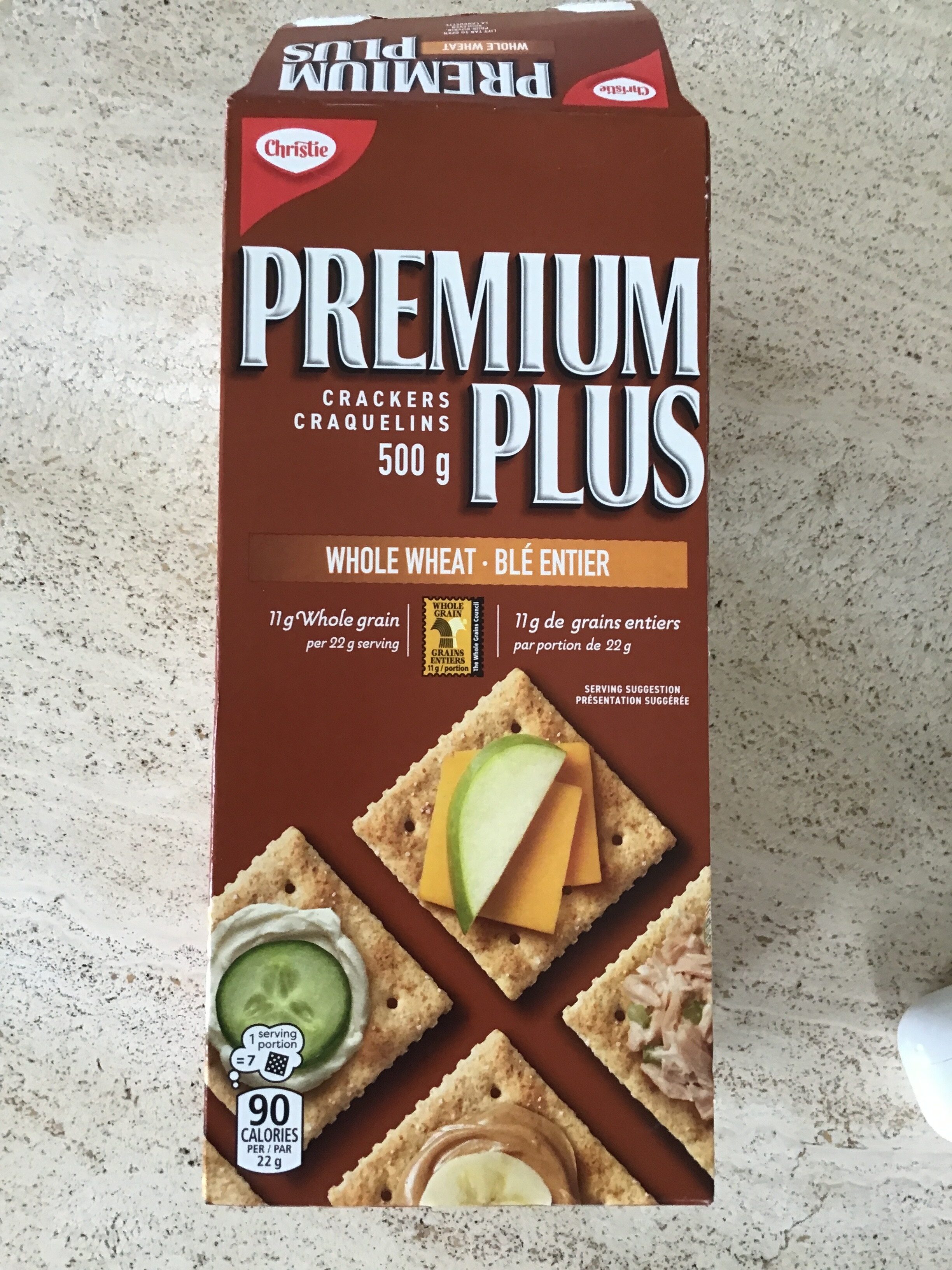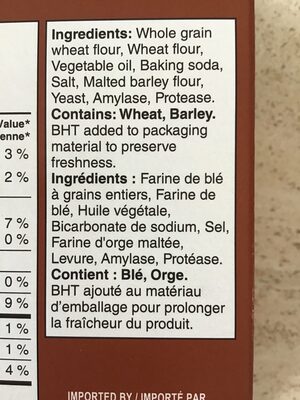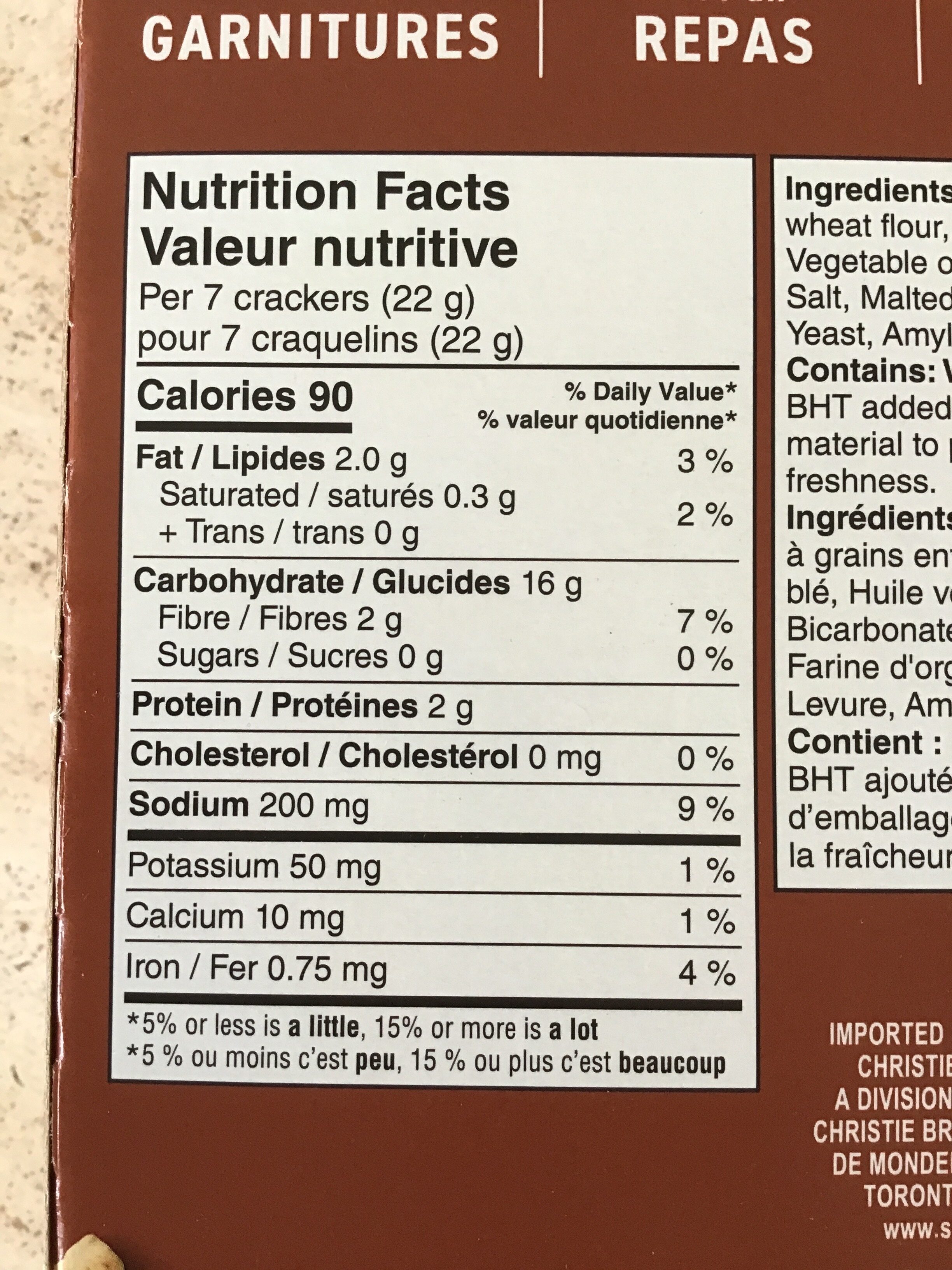Help us make food transparency the norm!
As a non-profit organization, we depend on your donations to continue informing consumers around the world about what they eat.
The food revolution starts with you!
Premium Plus whole wheat crackers - Christie - 500 grams
Premium Plus whole wheat crackers - Christie - 500 grams
This product page is not complete. You can help to complete it by editing it and adding more data from the photos we have, or by taking more photos using the app for Android or iPhone/iPad. Thank you!
×
Barcode: 0066721018748 (EAN / EAN-13) 066721018748 (UPC / UPC-A)
Quantity: 500 grams
Brands: Christie
Categories: Snacks, Salty snacks, Appetizers, Crackers
Labels, certifications, awards: Whole wheat whole grain
Origin of ingredients: Canada
Matching with your preferences
Health
Ingredients
-
9 ingredients
Whole grain wheat flour, Wheat flour, Vegetable oil, Baking soda, Salt, Malted barley flour, Yeast, Amylase, ProteaseAllergens: Gluten
Food processing
-
Processed foods
Elements that indicate the product is in the 3 - Processed foods group:
- Category: Salty snacks
- Ingredient: Salt
- Ingredient: Vegetable oil
Food products are classified into 4 groups according to their degree of processing:
- Unprocessed or minimally processed foods
- Processed culinary ingredients
- Processed foods
- Ultra processed foods
The determination of the group is based on the category of the product and on the ingredients it contains.
Additives
-
E1100 - Alpha-Amylase
Amylase: An amylase -- is an enzyme that catalyses the hydrolysis of starch into sugars. Amylase is present in the saliva of humans and some other mammals, where it begins the chemical process of digestion. Foods that contain large amounts of starch but little sugar, such as rice and potatoes, may acquire a slightly sweet taste as they are chewed because amylase degrades some of their starch into sugar. The pancreas and salivary gland make amylase -alpha amylase- to hydrolyse dietary starch into disaccharides and trisaccharides which are converted by other enzymes to glucose to supply the body with energy. Plants and some bacteria also produce amylase. As diastase, amylase was the first enzyme to be discovered and isolated -by Anselme Payen in 1833-. Specific amylase proteins are designated by different Greek letters. All amylases are glycoside hydrolases and act on α-1‚4-glycosidic bonds.Source: Wikipedia
-
E1101 - Protease
Protease: A protease -also called a peptidase or proteinase- is an enzyme that performs proteolysis: protein catabolism by hydrolysis of peptide bonds. Proteases have evolved multiple times, and different classes of protease can perform the same reaction by completely different catalytic mechanisms. Proteases can be found in Animalia, Plantae, Fungi, Bacteria, Archaea and viruses.Source: Wikipedia
-
E500 - Sodium carbonates
Sodium carbonates (E500) are compounds commonly used in food preparation as leavening agents, helping baked goods rise by releasing carbon dioxide when they interact with acids.
Often found in baking soda, they regulate the pH of food, preventing it from becoming too acidic or too alkaline. In the culinary world, sodium carbonates can also enhance the texture and structure of foods, such as noodles, by modifying the gluten network.
Generally recognized as safe, sodium carbonates are non-toxic when consumed in typical amounts found in food.
-
E500ii - Sodium hydrogen carbonate
Sodium hydrogen carbonate, also known as E500ii, is a food additive commonly used as a leavening agent.
When added to recipes, it releases carbon dioxide gas upon exposure to heat or acids, causing dough to rise and resulting in a light, fluffy texture in baked goods.
It is generally recognized as safe (GRAS) by regulatory authorities when used in appropriate quantities and poses no significant health risks when consumed in typical food applications.
Ingredients analysis
-
May contain palm oil
Ingredients that may contain palm oil: Vegetable oil
-
Vegan
No non-vegan ingredients
-
Vegetarian
No non-vegetarian ingredients detected
-
Details of the analysis of the ingredients
en: Whole grain wheat flour, Wheat flour, Vegetable oil, Baking soda, Salt, Malted barley flour, Yeast, Amylase, Protease- Whole grain wheat flour -> en:whole-wheat-flour - vegan: yes - vegetarian: yes - ciqual_proxy_food_code: 9410 - percent_min: 11.1111111111111 - percent_max: 100
- Wheat flour -> en:wheat-flour - vegan: yes - vegetarian: yes - ciqual_proxy_food_code: 9410 - percent_min: 0 - percent_max: 50
- Vegetable oil -> en:vegetable-oil - vegan: yes - vegetarian: yes - from_palm_oil: maybe - percent_min: 0 - percent_max: 33.3333333333333
- Baking soda -> en:e500ii - vegan: yes - vegetarian: yes - percent_min: 0 - percent_max: 25
- Salt -> en:salt - vegan: yes - vegetarian: yes - ciqual_food_code: 11058 - percent_min: 0 - percent_max: 2.2727272727273
- Malted barley flour -> en:barley-malt-flour - vegan: yes - vegetarian: yes - ciqual_food_code: 9550 - percent_min: 0 - percent_max: 2.2727272727273
- Yeast -> en:yeast - vegan: yes - vegetarian: yes - percent_min: 0 - percent_max: 2.2727272727273
- Amylase -> en:e1100 - vegan: yes - vegetarian: yes - percent_min: 0 - percent_max: 2.2727272727273
- Protease -> en:e1101 - vegan: yes - vegetarian: yes - percent_min: 0 - percent_max: 2.2727272727273
Nutrition
-
Average nutritional quality
⚠ ️Warning: the amount of fruits, vegetables and nuts is not specified on the label, it was estimated from the list of ingredients: 0This product is not considered a beverage for the calculation of the Nutri-Score.
Positive points: 5
- Proteins: 5 / 5 (value: 9.0909090909091, rounded value: 9.09)
- Fiber: 5 / 5 (value: 9.0909090909091, rounded value: 9.09)
- Fruits, vegetables, nuts, and colza/walnut/olive oils: 0 / 5 (value: 0, rounded value: 0)
Negative points: 15
- Energy: 5 / 10 (value: 1712, rounded value: 1712)
- Sugars: 0 / 10 (value: 0, rounded value: 0)
- Saturated fat: 0 / 10 (value: 0, rounded value: 0)
- Sodium: 10 / 10 (value: 909.09090909092, rounded value: 909.1)
The points for proteins are not counted because the negative points are greater or equal to 11.
Nutritional score: (15 - 5)
Nutri-Score:
-
Nutrient levels
-
Fat in moderate quantity (9.09%)
What you need to know- A high consumption of fat, especially saturated fats, can raise cholesterol, which increases the risk of heart diseases.
Recommendation: Limit the consumption of fat and saturated fat- Choose products with lower fat and saturated fat content.
-
Saturated fat in low quantity (0%)
What you need to know- A high consumption of fat, especially saturated fats, can raise cholesterol, which increases the risk of heart diseases.
Recommendation: Limit the consumption of fat and saturated fat- Choose products with lower fat and saturated fat content.
-
Sugars in low quantity (0%)
What you need to know- A high consumption of sugar can cause weight gain and tooth decay. It also augments the risk of type 2 diabetes and cardio-vascular diseases.
Recommendation: Limit the consumption of sugar and sugary drinks- Sugary drinks (such as sodas, fruit beverages, and fruit juices and nectars) should be limited as much as possible (no more than 1 glass a day).
- Choose products with lower sugar content and reduce the consumption of products with added sugars.
-
Salt in high quantity (2.27%)
What you need to know- A high consumption of salt (or sodium) can cause raised blood pressure, which can increase the risk of heart disease and stroke.
- Many people who have high blood pressure do not know it, as there are often no symptoms.
- Most people consume too much salt (on average 9 to 12 grams per day), around twice the recommended maximum level of intake.
Recommendation: Limit the consumption of salt and salted food- Reduce the quantity of salt used when cooking, and don't salt again at the table.
- Limit the consumption of salty snacks and choose products with lower salt content.
-
-
Nutrition facts
Nutrition facts As sold
for 100 g / 100 mlCompared to: Crackers Energy 1,712 kj
(409 kcal)-9% Fat 9.091 g -47% Saturated fat 0 g -100% Carbohydrates 72.727 g +17% Sugars 0 g -100% Fiber 9.091 g +126% Proteins 9.091 g -5% Salt 2.273 g +23% Fruits‚ vegetables‚ nuts and rapeseed‚ walnut and olive oils (estimate from ingredients list analysis) 0 %
Environment
-
Eco-Score B - Low environmental impact
⚠ ️Select a country in order to include the full impact of transportation.The Eco-Score is an experimental score that summarizes the environmental impacts of food products.→ The Eco-Score was initially developped for France and it is being extended to other European countries. The Eco-Score formula is subject to change as it is regularly improved to make it more precise and better suited to each country.Life cycle analysis
-
Average impact of products of the same category: A (Score: 87/100)
Category: Salty snacks, crackers, plain
Category: Salty snacks, crackers, plain
- PEF environmental score: 0.22 (the lower the score, the lower the impact)
- including impact on climate change: 1.59 kg CO2 eq/kg of product
Stage Impact Agriculture
59.7 %Processing
22.4 %Packaging
10.6 %Transportation
5.2 %Distribution
2.2 %Consumption
0.0 %
Bonuses and maluses
-
Origins of ingredients with a medium impact
Bonus: +2
Environmental policy: +2
Transportation: 0
Origin of the product and/or its ingredients % of ingredients Impact Canada 100 %Medium
-
Packaging with a medium impact
Malus: -11
Shape Material Recycling Impact 1 Box Paperboard Discard plastic wrappers, recycle box with paper Low 4 Wrapper Plastic Discard High ⚠ ️ The information about the packaging of this product is not sufficiently precise (exact shapes and materials of all components of the packaging).⚠ ️ For a more precise calculation of the Eco-Score, you can modify the product page and add them.
If you are the manufacturer of this product, you can send us the information with our free platform for producers.
Eco-Score for this product
-
Impact for this product: B (Score: 78/100)
Product: Premium Plus whole wheat crackers - Christie - 500 grams
Life cycle analysis score: 87
Sum of bonuses and maluses: -9
Final score: 78/100
-
Carbon footprint
-
Equal to driving 0.8 km in a petrol car
159 g CO² per 100g of product
The carbon emission figure comes from ADEME's Agribalyse database, for the category: Salty snacks, crackers, plain (Source: ADEME Agribalyse Database)
Stage Impact Agriculture
53.6 %Processing
18.8 %Packaging
17.7 %Transportation
8.7 %Distribution
1.2 %Consumption
0.0 %
Packaging
-
Packaging with a medium impact
-
Packaging parts
4 x Wrapper 500 g (Plastic: 3 g)
1 x Box 500 g (Paperboard: 46 g)
-
Packaging materials
Material % Packaging weight Packaging weight per 100 g of product Paper or cardboard 79.3% 46 g 9.2 g Plastic 20.7% 12 g 2.4 g Total 100% 58 g 11.6 g
-
Transportation
-
Origins of ingredients
Origins of ingredients with a medium impact
Origin of the product and/or its ingredients % of ingredients Impact Canada 100 %Medium
Report a problem
-
Incomplete or incorrect information?
Category, labels, ingredients, allergens, nutritional information, photos etc.
If the information does not match the information on the packaging, please complete or correct it. Open Food Facts is a collaborative database, and every contribution is useful for all.
Data sources
Product added on by kiliweb
Last edit of product page on by jeannie1.
Product page also edited by acuario, elcoco, januarius, openfoodfacts-contributors, yuka.sY2b0xO6T85zoF3NwEKvlhNEcNaOrG_rKzLUmkm1746FKJ7WStFq6aiqHKo, yuka.sY2b0xO6T85zoF3NwEKvlkkWC__h8jXiZhPjnW6B-8--Dp3WSshr8taqY6s, yuka.sY2b0xO6T85zoF3NwEKvllNWD_3lnQ_rLxLWgUCZ4oqkPs34f8tpvLCqHas.











